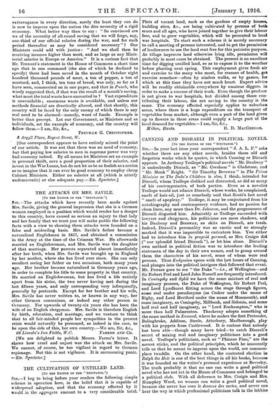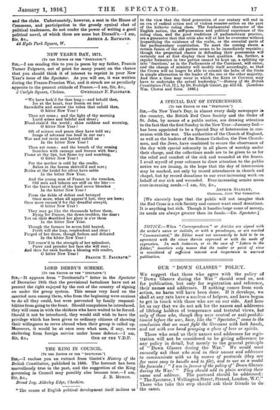CANNING AND DISRAELI IN POLITICAL NOVELS.
[TO THE EDITOR OT THE " SPECTATOR."' SIR,—In your last issue your correspondent " J. A. L. F." asks whether there are any other novels, besides those old and forgotten works which he quotes, in which Canning or Disraeli appears. In Anthony Trollope's political novels " Mr. Daubeny " is undoubtedly Disraeli, as " Mr. Gresham " is Gladstone, and " Mr. Monk " Bright. " Sir Timothy Beeswax " in The Prime Minieer or The Duke's Children is also, I think, intended for Disraeli, whom Trollops disliked and distrusted, as did so many of his contemporaries, of both parties. Even as a novelist Trollope would not admire Disraeli, whose works, he complained, smelt of hair-oil, just as somebody said that Scott's last novel " smelt of apoplexy." Trollope, it may be conjectured from his autobiography and contemporary evidence, had no passion for clean linen, any more than Dr. Johnson, and the gorgeousness of Disraeli disgusted him. Admirably as Trollops succeeded with lawyers and clergymen, his politicians are mere shadows, and his Daubeny and Beeswax, as skits on Disraeli, are trash. Indeed, Disraeli's personality was so exotic and so strongly marked that it was impossible to caricature him. You either had to introduce him in proprid persond, as Mrs. Craigie did (" our splendid friend Disraeli "), or let him alone. Disraeli's own method in political fiction was to introduce the leading statesmen of the day in their own names, and to group around them the characters of his novel, some of whom were real persons. Thus Endyntion opens with the last hours of Canning, and plunges into the political intrigues that followed that event. Mr. Ferraro goes to see " the Duke "—i.e., of Wellington—and Sir Robert Peel and Lord John Russell are frequently introduced. In Coningsby and Sybil we have the same mixture of real and imaginary persons, the Duke of Wellington, Sir Robert Peel, and Lord Lyndhurst flitting across the stage through figures, some real under pseudonyms (as Croker under the name of Rigby, and Lord Hertford under the name of Monmouth), and some imaginary, as Coningsby, Milbank, and Sidonia, and some half real and half imaginary, as " Loth Roehampton," who is more than half Palmerston. Thackeray adopts something of the same method in Esmond, where he makes the first Pretender, Bolingbroke, Addison, Steele, Attcrbury, Marlborough, play with his puppets from Castlewood. It is curious that nobody has been able—though many have tried—to catch Disraeli's secret of mixing real and imaginary politicians into a good novel. Trollope's politicians, such as " Phineas Finn," are the merest sticks, and the political principles, which he innocently tells us that he meant to impress upon the world, are common- place twaddle. On the other hand, the contested election in Ralph the Heir is one of the best things in all his books, because it was founded on the writer's personal experience at Beverley. The truth probably is that no one can write a good political novel who has not sat in the House of Commons and belonged to a political club. With all deference to Mrs. Craigie and Mrs. Humphry Ward, no woman can write a good political novel, because she never has seen le damns des cartes, and never can hear the way in which professional politicians talk in the lobbiea
and the clubs. Unfortunately, however, a seat in the House of Commons, and participation in the grossly cynical chat of political tradesmen, do not confer the power of writing a good political novel, of which there are none but Disraeli's.—I am,











































 Previous page
Previous page